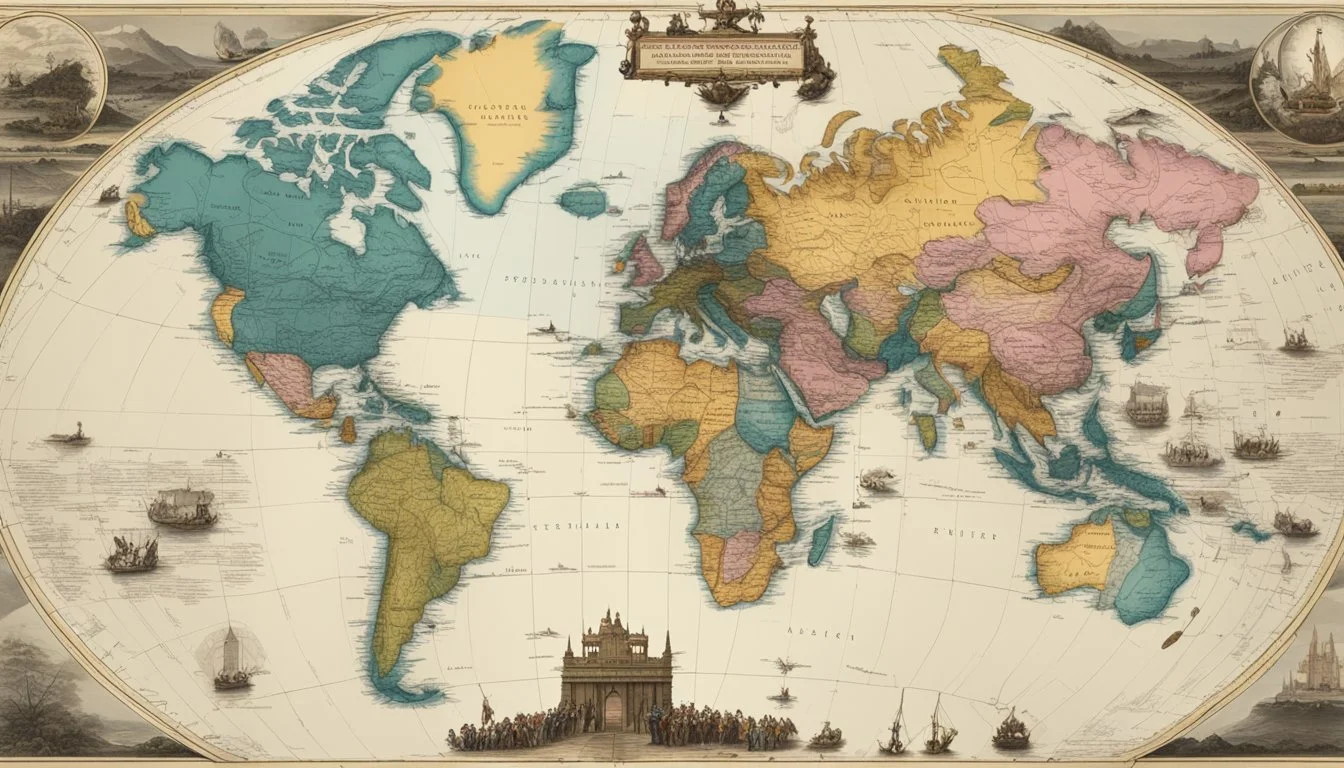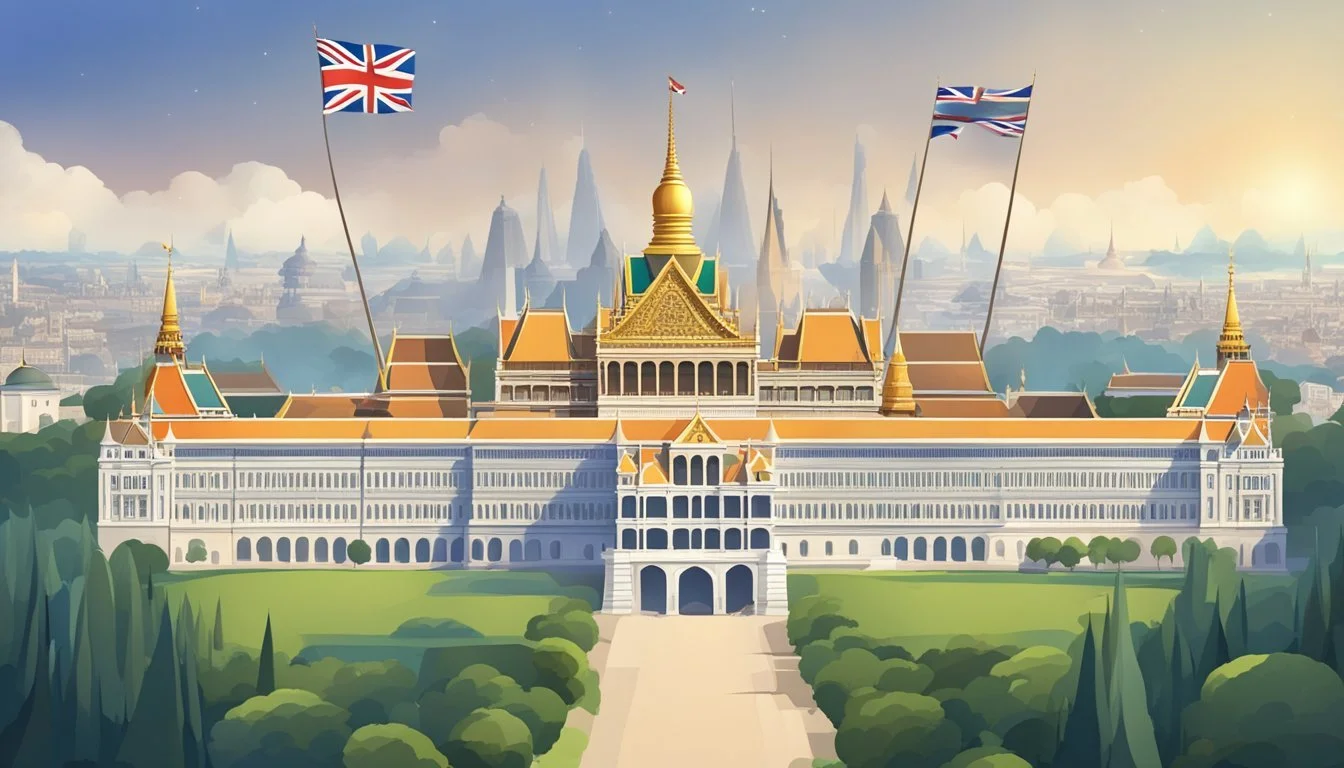7 Documentaries on the Rise and Fall of the British Empire
A Historical Journey Through Imperialism
The British Empire stands as one of the most influential and far-reaching empires in world history. At its peak, it controlled vast territories across the globe, encompassing nearly a quarter of the Earth's land surface and population. Documentaries exploring this empire's rise and fall offer viewers a captivating journey through centuries of conquest, colonization, and eventual decolonization.
These films provide valuable insights into the complex legacy of British imperialism, shedding light on its lasting impacts on modern geopolitics, cultures, and societies worldwide. From the early days of exploration and trade to the challenges of maintaining global dominance, documentaries on this subject reveal the triumphs, struggles, and controversies that shaped the British Empire's trajectory. By examining this historical phenomenon through the lens of cinema, audiences gain a deeper understanding of the forces that propelled Britain to unprecedented power and the factors that ultimately led to its decline.
1) The Rise and Fall of the British Empire
The British Empire emerged as a dominant global force in the 17th century. It expanded rapidly, fueled by naval superiority, technological advancements, and economic ambitions.
At its peak in the early 20th century, the Empire controlled nearly a quarter of the world's land and population. Its reach spanned continents, from North America to Africa, Asia, and Oceania.
The Empire's influence shaped global trade, culture, and politics. It established English as a widespread language and left lasting impacts on legal and educational systems in many countries.
However, the Empire's decline began after World War I and accelerated following World War II. Economic pressures, changing global dynamics, and growing independence movements contributed to its dissolution.
The process of decolonization unfolded over several decades. Many former colonies gained independence, transforming into sovereign nations. This marked the end of British imperial dominance on the world stage.
Today, the legacy of the British Empire remains complex and controversial. Its historical impact continues to influence international relations, cultural identities, and economic systems worldwide.
2) Queen Victoria's Empire
Queen Victoria's Empire explores the reign of Britain's longest-serving monarch and her impact on the British Empire. This documentary series examines the expansion of British territories during Victoria's rule.
The program covers key events from Victoria's ascension to the throne at age 18 through her 63-year reign. It highlights the industrial revolution and technological advancements that fueled imperial growth.
Viewers learn about Victoria's relationship with Prince Albert and his influence on royal affairs. The series also delves into the complex dynamics between the monarchy and the government during this era of change.
Colonial conquests in India, Africa, and other regions are examined, along with their lasting effects. The documentary addresses both the perceived benefits and criticisms of British imperialism under Victoria's rule.
Through archival footage and expert interviews, Queen Victoria's Empire provides insight into a pivotal period of British history. It offers a balanced look at the triumphs and challenges of managing a vast global empire.
3) The Last Days of the Raj
"The Last Days of the Raj" is a compelling 90-minute drama-documentary that chronicles the final months of British rule in India. Filmed on location, it offers a vivid portrayal of the tumultuous events leading up to India's independence in 1947.
The documentary focuses on Lord Louis Mountbatten, who arrived in India in March 1947 as Britain's Last Viceroy. His mission was to oversee the transfer of power to an independent India, a task fraught with challenges and complexities.
The film explores the political tensions and social upheaval that characterized this pivotal period. It depicts the negotiations between key figures and the difficult decisions that shaped the future of the subcontinent.
Viewers gain insight into the partition of India and the creation of Pakistan, events that resulted in widespread violence and mass migrations. The documentary highlights the human cost of these political changes, bringing to life the experiences of those caught in the transition.
Through a blend of historical reenactments and expert commentary, "The Last Days of the Raj" provides a nuanced look at the end of British colonial rule in India. It serves as a valuable resource for understanding this critical juncture in world history.
4) Secrets of the British Empire
This documentary explores the hidden aspects of British imperial rule. It examines lesser-known strategies and tactics employed to maintain control over vast territories.
The film reveals how the Empire relied on networks of local collaborators and informants to govern effectively. It also sheds light on covert intelligence operations that helped quell rebellions and maintain order.
Economic exploitation played a crucial role in imperial expansion. The documentary details how British companies extracted resources and wealth from colonies, often at great cost to local populations.
Cultural imperialism emerges as another key theme. The film shows how British customs, language, and institutions were imposed on diverse societies across the globe.
The documentary also addresses controversial topics like divide-and-rule policies. It examines how colonial administrators exploited existing social divisions to maintain power.
By uncovering these hidden aspects, the film provides a more nuanced understanding of how the British Empire functioned. It offers viewers insight into the complex mechanisms that sustained one of history's largest empires.
5) The British Empire in Color
This three-part documentary series offers a unique perspective on the British Empire through the use of rare color footage. It chronicles the empire's rise, fall, and lasting impact across the globe.
The series combines original color archive film with personal letters and diary extracts to provide a comprehensive view of imperial history. Much of the footage had never been seen before, offering viewers fresh insights into this pivotal era.
Narrated by Art Malik, the documentary explores the complexities and contradictions of British rule. It examines both the rulers' and the ruled's perspectives, presenting a balanced account of the empire's legacy.
The British Empire in Color covers significant events like Queen Elizabeth II's coronation and the subsequent decades of imperial decline. It highlights the empire's contributions in education, technology, law, and democracy.
At the same time, the series does not shy away from addressing the darker aspects of colonialism. It confronts issues of prejudice, discrimination, cultural bigotry, and racism that were also part of the imperial experience.
6) The Empire Files: British Imperialism
The Empire Files presents a critical examination of British imperialism and its lasting impact on the world. This documentary series delves into the often overlooked aspects of Britain's colonial history.
Hosted by journalist Abby Martin, the series explores the exploitation and violence that underpinned the expansion of the British Empire. It sheds light on the economic motivations behind colonization and the methods used to maintain control over vast territories.
The documentary features interviews with historians, activists, and people from former colonies. These perspectives provide insights into the long-term consequences of imperial rule on indigenous cultures and economies.
Through archival footage and expert analysis, The Empire Files traces the evolution of British imperialism from its early trading companies to its global dominance. It examines key events and policies that shaped the empire's rise and eventual decline.
The series also addresses the legacy of British imperialism in modern geopolitics. It discusses how past colonial relationships continue to influence international dynamics and power structures today.
7) An Imperial History of the British Capital
"An Imperial History of the British Capital" examines London's transformation from a Roman outpost to the heart of a global empire. The documentary traces the city's growth as it became the command center for British colonial expansion.
Viewers are taken on a journey through London's iconic landmarks, each telling a story of imperial power. The Tower of London, once a symbol of Norman conquest, later housed the Crown Jewels amassed from far-flung colonies.
The film explores how London's docks became the busiest in the world, handling goods from across the empire. It shows how the city's architecture reflected its imperial status, with grand buildings like the Foreign Office showcasing Britain's global reach.
The documentary also delves into the lives of London's diverse population during the imperial era. It examines how colonialism shaped the city's demographics, culture, and economy.
By the end, viewers gain insight into how London's role as an imperial capital influenced its development and left lasting impacts on the city's identity and structure.
The Historical Context of the British Empire
The British Empire emerged as a global superpower through colonial expansion and economic dominance. Its rise and fall dramatically shaped world history across multiple centuries.
Colonial Expansion and Global Influence
The British Empire's expansion began in the 16th century with early settlements in North America and the Caribbean. By the 19th century, it had become the largest empire in history, controlling territories on every continent.
At its peak, the empire encompassed nearly a quarter of the world's land area and population. Key colonial holdings included India, often called the "jewel in the crown," as well as vast swaths of Africa, the Middle East, and Southeast Asia.
The empire's global reach allowed Britain to project military power and cultural influence worldwide. English became a global lingua franca, while British political and legal systems were exported to colonies.
Economic Impacts of the Empire
Britain's imperial possessions fueled its economic growth and industrial revolution. The empire provided access to raw materials, new markets for British goods, and opportunities for investment.
Colonial trade networks facilitated the flow of commodities like cotton, sugar, and tea. This trade enriched British merchants and filled government coffers through customs duties and taxes.
The empire also enabled the exploitation of labor and resources in colonized regions. Practices like slavery and indentured servitude supported plantation economies in the Americas and Caribbean.
India played a crucial economic role, supplying raw materials for British industry and serving as a captive market for manufactured goods. The East India Company initially dominated trade before the British government assumed direct control.
Impact on Colonized Nations
British colonial rule profoundly shaped the nations it governed, leaving lasting imprints on societies and cultures. The empire's influence extended far beyond economic and political realms, fundamentally altering social structures and local traditions.
Cultural Exchange and Colonial Legacy
The British Empire facilitated extensive cultural exchange between Britain and its colonies. English became a lingua franca in many regions, spreading Western education systems and literature. This linguistic legacy persists today in countries like India, Nigeria, and Singapore.
British architectural styles transformed colonial cityscapes. Victorian and Georgian buildings still stand in former colonies, from Cape Town to Kolkata. The empire also introduced sports like cricket and football, which remain hugely popular in many former colonies.
Colonial policies often disrupted traditional social hierarchies. The introduction of Western legal systems and bureaucracies reshaped local governance structures. These changes had long-lasting effects on social mobility and power dynamics within colonized societies.
Resistance Movements and Decolonization
Colonial rule sparked widespread resistance across the empire. Nationalist movements emerged, drawing inspiration from both local traditions and Western ideals of self-determination. Leaders like Mahatma Gandhi in India and Kwame Nkrumah in Ghana mobilized mass movements against British rule.
Anti-colonial struggles took various forms, from non-violent civil disobedience to armed rebellions. The Mau Mau uprising in Kenya and the Indian Rebellion of 1857 exemplify the violent resistance faced by British authorities.
Decolonization accelerated after World War II, with most British colonies gaining independence by the 1960s. This process often involved complex negotiations and, in some cases, bloodshed. The partition of India in 1947 led to massive population displacements and communal violence.
Post-independence, many former colonies grappled with the legacy of colonial rule. Border disputes, ethnic tensions, and economic challenges often stemmed from colonial-era policies and arbitrary boundaries.



